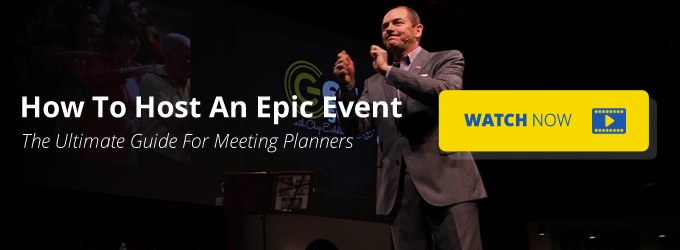As a meeting planner, you can tell when someone is giving a speech they’ve given a hundred times. It’s never been changed – not personalized for a specific audience.
I remember about 14 years ago I was speaking at a convention for Culligan. They had General Norman Schwarzkopf do the opening speech and I was the closing speaker.
I was there sitting with Mike, the CEO. I remembered several years before we had the General speak at a Mastery Event with Tony.
He delivered the exact same speech, word-for-word, I had heard when I was an audience member years before.
Mike asked me what I thought after he was done. Diplomatically, I said, “He certainly added a lot of gravitas to the event. but if I did what he did, I would not have a business.”
Mike asked what I meant.
I said, “During his talk he did not even mention Culligan once!”
Mike replied, “I had breakfast with General Schwarzkopf and I asked him if he wanted to know more about the company and he said no.”
Sure, a reputable name like General Schwarzkopf may be inspiring, but without customizing the opening and closing keynotes to your event, that’s all it is.
If this has happened to you before, it’s time to regroup and come up with some strategies to make sure this doesn’t happen EVER again.
Here are four ways to customize your event and avoid a canned-speech-catastrophe, audience boredom, and failure.
1. Have a clear theme and an action-oriented tagline.
There’s no better way to tank your event than to not give it a specific direction.
Your internal team should be working together – with you and each other – before the event to choose a theme and action-oriented tagline.
It’s also crucial that they work closely with the speaker to make sure everyone has the same vision and goals.
As you ask the different players what their desired outcome is, they’re more likely to buy in and create a seamless experience for the attendees.
It’s a good idea to encourage your opening and closing speaker (as well as workshop presenters) to keep the presentation to three main points. This ensures that your chosen conference theme doesn’t get lost in a bunch of unnecessary, off-topic information.
Less IS more.
2. Communicate early.
Communication is one of the vital components for any meeting planner to put on a successful event.
But the conversations should begin well in advance of the actual occasion.
Let the speakers know that they should communicate their plan at least three weeks out.
This prevents them from creating a presentation on the fly– like, literally on the airplane en route to the event! This is often the standard.
Get them the necessary information they need to interview key individuals before the event takes place – and with plenty of time to get a hold of people.
Make sure you also discuss the specifics of how he or she will handle customer service, sales, distribution, etc.
3. Before you hire a speaker, ask about process.
As a meeting planner, you understand that a keynote speaker’s presentation at the opening and closing of the event will be different than a speaker you bring in to do a training.
First and foremost, make sure you choose a speaker who can bring the right kind of energy for your event.
But it’s also important that you find out how they’ll customize and personalize their presentation for your specific audience and organization.
Here’s an example of the process a speaker may follow to prep for a fresh, customized, non-canned speech:
- Conducts website research.
- Sends you, the meeting planner, a questionnaire to help her customize her keynote presentations to your organization’s needs and goals.
- Schedules a phone conversation with you for further planning and clarification.
- Reaches out to key participants via email or phone to get detailed information to integrate into the presentation.
- Conducts necessary follow-up phone calls.
- Creates a personalized handout for attendees.
The audience can tell when a speaker has done their homework and will appreciate how you’ve customized your event.
4. See what other people are doing
You’re missing out on a golden opportunity if you aren’t talking to other meeting planners who are already killing.
Ask other people what’s working for them, or better yet, talk to people in the audience and get their feedback.
Incorporating their insights into the event will add a ton of value for the attendees.
Customize your event for success
A meeting planner is only as good as the attendees’ experiences.
To get the most out of your next event, make sure you choose a clear theme with an action-oriented tagline, stay in regular communication with the speaker you’ve hired, and get the input of people working in the fields related to the theme.
Your audience will appreciate the level of thought and effort into your amazing, customized event.

